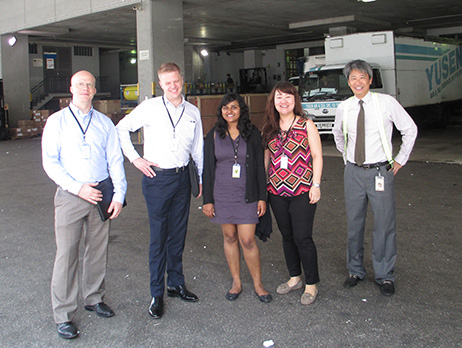MBA Strategic Consulting Program heads to Singapore
A team of Foster students recently traveled to Singapore for an MBA Strategic Consulting Project. The following is an account by Kyle Sullivan (MBA 2014) of his experiences there and observations of the city-state.
 It’s cold and rainy in Seattle; typical winter conditions. It’s hard to imagine I was enjoying 85-degree weather just a few weeks ago in Singapore.
It’s cold and rainy in Seattle; typical winter conditions. It’s hard to imagine I was enjoying 85-degree weather just a few weeks ago in Singapore.
Despite having lived in Asia for an extended period, I had never visited Singapore before. My friends often described it as uneventful, that it had none of the dynamism of China or Hong Kong; “Asia lite,” they would call it. I could not disagree more.
From the moment we landed, I noticed a sense of significance about the place. Driving westward into town along Singapore’s East Coast Parkway (ECP), parallel to the waterfront, it is all but impossible to ignore the armada of container ships lingering in the Singapore Strait. A few miles down the road, the view of the ships becomes obscured by an army of quay cranes towering above the Port of Singapore, Asia’s second largest port. Adjacent to the port, gleaming skyscrapers bearing the names Standard Chartered, HSBC, and Microsoft press up against Singapore’s Marina Bay. Surrounded by so much commercial activity, it feels as if you are in the center of the world.
I traveled to Singapore with a team of three classmates—Noah, Shalini, and Lisa—to work on a project for a Washington-state manufacturing company. The company had been exploring the possibility of opening a warehouse in Singapore in order to be closer to its customers in Asia Pacific. Our task was three-fold: gather information about the local market for the company’s products, assess the local real estate market, and make connections with headhunters. The project’s intent was to inform the client company about the most appropriate way to set up an operation in Singapore.
 It was a busy ten days for us, packed with meetings, dinners, and networking events. One of the key takeaways from our meetings with various business partners was that there are very clear trade-offs for conducting business in Singapore. For example, business registration is conducted online and takes a matter of hours (whereas in China it can take more than six months), laws and regulations are evenly enforced, and the corporate income tax rate is a flat 17 percent. The downside is that the average price for a warehouse is roughly triple the price in Seattle, and annual wage increases are some of the highest in Asia Pacific.
It was a busy ten days for us, packed with meetings, dinners, and networking events. One of the key takeaways from our meetings with various business partners was that there are very clear trade-offs for conducting business in Singapore. For example, business registration is conducted online and takes a matter of hours (whereas in China it can take more than six months), laws and regulations are evenly enforced, and the corporate income tax rate is a flat 17 percent. The downside is that the average price for a warehouse is roughly triple the price in Seattle, and annual wage increases are some of the highest in Asia Pacific.
One of the most interesting meetings was with a company called Mapletree, which is one of Singapore’s largest industrial property management firms. We met with a man named James, who heads up marketing for Mapletree’s industrial property division, to hear his expertise on Singapore’s industrial property market and to understand his company’s portfolio of warehouse properties. As we were wrapping up the conversation, out of curiosity I asked James for his opinion about what country in Asia Pacific will be the next major driver of growth for industrial property sales. He paused for a moment, and grinned. Waiting in suspense, as if he was about to divulge a closely guarded secret, he simply replied, “Indonesia.”
Learn more about the MBA Strategic Consulting Program at the Foster School.
